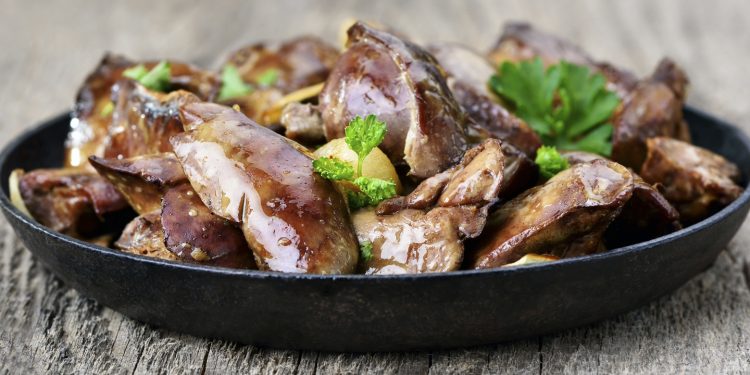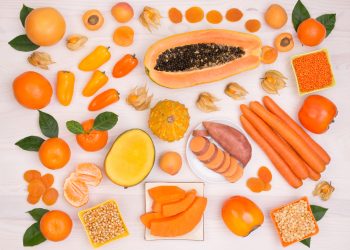Something is off about the way we eat.
Despite having official nutrition guidelines that check all the obvious boxes — staying low-fat, eating plenty of fruits and veggies, getting enough fibre, etc — we’re fatter and sicker than ever before. Over 30% of UK children are obese or overweight. [1]
What’s causing all this?
Basically, the nutrition recommendations to eat more fruits and veggies and fewer animal products have left people devoid of animal products — and subject to wild cravings. For most people, ultra-processed junk foods have filled the void. Today as much as 50% of the average person’s calories come from these ultra-processed foods. [2]
Thankfully, avoiding this type of junk diet is actually pretty simple. It’s not a matter of denial or self-discipline as much as it’s a matter of replacing junk calories with nourishing ones!
And the most nourishing food of all is grass-fed, organic organ meat.
In this article we’ll be diving deep into the difference between organic and non-organic organ meats — and why it matters so much for your health.
Organic vs. non-organic: the major differences
Organic organ meat differs from the non-organic stuff in four main ways. It’s got:
- More nutrients
- Fewer toxins
- A better fatty acid profile
- A different taste and texture
More nutrients
There are surprisingly few studies that go into the difference between organ meats of different qualities — actually, there are none.
But we can get to understanding the difference by looking at the results of a 2007 analysis that compared pastured and grain-fed beef. [3]
This analysis showed that grass-fed beef was higher in several key nutrients, including vitamin E, beta carotene, and vitamin C. (Yes, red meat does contain some vitamin C! Grass-fed beef contains over 10 milligrams of vitamin C per pound.) It’s thought that high-quality beef and beef organs contain enough vitamin C to reliably prevent scurvy. [4]
Grass-fed, organic meat is higher in the natural antioxidant vitamin E, too — while simultaneously containing smaller amounts of lipo-oxidising polyunsaturated fats. [5]
Another nutritional advantage of organic meats and organ meats? Higher amounts of coenzyme Q10. This special molecule can be made by your body, but as you age its endogenous levels decline enough that choosing out CoQ10-rich foods becomes more important. CoQ10 plays a huge role in the energy production process.
While muscle meat contains some CoQ10, organic beef heart is the very best source. (Interestingly enough, this special enzyme is shown to benefit heart health.) [6]
Summing things up:
Non-organic meat is far better than nothing, but organic organ meats provide simply amazing nutrition.
Fewer toxins
In addition to being slightly less nutritious, non-organic meats are at greater risk of being exposed to environmental pollutants.
Pesticide use is unfortunately common in industrial feedlots, which means that toxins like glyphosate and 2-4D often end up in the meat of non-organic, grain-fed animals. [7][8] We’ve only begun to understand the full extent to which these known toxins hurt humans.
It’s pretty telling, though, that court cases have been won against glyphosate producers with the claim that their products cause cancer. [9] Dr. Stephanie Seneff’s research identifies one potential mechanism for this: glyphosate replaces the anti-inflammatory amino acid glycine within our body’s intestinal tract. [10]
Other toxins found in non-organic meat double as hormone disruptors. Atrazine, an herbicide that’s sometimes sprayed on the corn cows then proceed to eat, mimics estrogen and produces de-differentiating effects. [11][12]
Non-organic meat also contains greater amounts of mold toxins and dioxins than the organic varieties. Dioxins are stubborn pollutants that don’t break down once introduced to an environment. [13]
Organic meat, on the other hand, is fed organic food that greatly reduces or eliminates exposure to toxic pollutants. Truly organic meat will be completely free from glyphosate and estrogen mimickers.
Summing things up:
Non-organic meat contains many potential toxins that organic organ meats lack.
A better fatty acid profile
Grass-fed organic meat has a better fatty acid profile than grain-fed meat does.
And by better, we mean more saturated, less inflammatory, and more metabolic.
Yes, you heard that right: organic beef’s highly saturated fat marks an improvement over grain-fed beef’s high PUFA (polyunsaturated fatty acid) content. Natural saturated fats actually have a wide variety of health benefits!
While lower in total PUFA content, grass fed beef contains higher amounts of anti-inflammatory omega 3 fatty acids — up to 500% more in some cases. [14] This combo gives organic beef a far superior omega 3:6 ratio.
Grass-fed organic beef is also rich in special fats like CLA (conjugated linoleic acid) and stearic acid. [15] One analysis discovered that organic beef’s stearic acid levels are 36% higher than grain fed’s. This may mean good things for your body composition: animal research has found that stearic acid boosts metabolism and reduces waist size. [16]
Both these fatty acids may improve body composition by helping your mitochondria burn fat for fuel. [17][18]
One more piece of good news: all the good stuff in organic organ meats can be had for fewer calories per serving, since they’re higher in protein and lower in fat than other alternatives. [19]
Summing things up:
Organic meat’s fatty acid profile is superior to non-organic meat’s in pretty much every way.
A different taste and texture
Organic and non-organic meat just taste different. Which one tastes better? It’s really just a matter of preference.
Organic beef is less sweet and more savoury than non-organic.
Grain fed beef’s taste is a direct result of its feed: a motley mix of corn, soy, and corn/soy by-products. It may taste good, but its sweetness comes at the expense of purity and nutrition.
Grass-fed organic beef, on the other hand, is fed a natural grass-based diet that results in earthier, more complex flavours. (Contrary to popular belief, properly-raised organic beef isn’t usually tougher or chewier than non-organic.)
Organic beef also looks different. Its fat takes on a darker, yellowish hue from the carotene it ingested throughout its pasture-raised lifetime. Its meat is also darker than what you might be accustomed to. [20]
So…which type of meat is tastier?
A palate accustomed to hyper-sweet modern foods may prefer the slightly sweeter flavour of non-organic, grain-fed beef — but this preference isn’t rooted in good nutrition. Consider resetting your palate with a keto or carnivore diet, and we think you’ll come to love the all-natural flavour of organic organ meat!
Just be sure to cook it right. If your organic organ meats are on the lower-fat side, consider frying them up in some coconut oil or butter.
Summing things up:
Don’t be fooled by grain-fed beef’s slightly sweeter taste — organic beef’s savoury flavour has always been the way to go.
How to find grass-fed organ meats
At this point you’re probably sold on the many upsides of organic, grass-fed organ meats. We sure are!
And that means you might be wondering how to find these types of products.
Thanks to the UK Organic Soil Association, it’s actually pretty simple. The Soil Association has been regulating organic foods since the 1960s — actually, they were the ones who first invented proper organic standards.
Products and brands that meet the Soil Association’s organic certification standards must be grown, farmed, and processed in accordance with nature. Pesticides, herbicides, and synthetics are expressly not allowed.
Certified products must also protect animal welfare, human health, and the environment. According to the Association, “no system of farming has higher levels of animal welfare than farms working to Soil Association organic standards.”
In other words, Soil Association-certified products are great for the environment…and great for you! We couldn’t be happier to be certified by this industry-leading group. You can read more about the UK Soil Association’s standards here.








